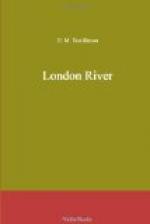Our empty boxes were discharged. Led by the admiral, the Windhover—with the rest of the fleet—lowered her trawl, and went dipping slowly and quietly over the hills, towing her sunken net. The admiral of a fishing-fleet is a great man. All is in his hands. He chooses the grounds. Our admiral, it was whispered to me, was the wizard of the north. The abundant fish-pastures were revealed to him in his dreams. It was my last evening on the Bank. The day had been wonderfully fine for winter and a sea that is notoriously evil. At twilight the wind dropped, the heave of the waters decreased. The scattered fleet, gliding through the hush, carried red, green, and white planets. The ships which lay in the western glow were black and simple shapes. Those to the east of us were remarkable with a chromatic prominence, and you thought, while watching them, that till that moment you had not really seen them. Presently the moon cleared the edge of the sea, a segment of frozen light, and moored to our stern with a quivering, ghostly line.
Coloured rockets sailed upwards from the admiral when he changed his mind and his course, and then the city of mobile streets altered its plan, and rewove its constellation. At midnight white flares burned forward on all the boats. The trawls were to be hauled. Our steam-winch began to bang its cogs in the heavy work of lifting the net. All hands assembled to see what would be our luck. The light sent a silver lane through the night, and men broke through the black walls of that brilliant separation of the darkness, and vanished on the other side. Leaning overside, I could see the pocket of our trawl drawing near, still some fathoms deep, a phosphorescent and flashing cloud. It came inboard, and was suspended over the deck, a bulging mass, its bottom was unfastened, and out gushed our catch, slithering over the deck, convulsive in the scuppers. The mass of blubber and plasm pulsed with an elfish glow.
9
We were homeward bound. The flat sea was dazzling with reflected sunshine, and a shade had to be erected over the binnacle for the man at the wheel. It might have been June, yet we had but few days to Christmas. The noon ceiling was a frail blue, where gauze was suspended in motionless loops and folds. The track of the sun was incandescent silver. A few sailing vessels idled in the North Channel, their sails slack; but we could not see a steamer in what is one of the world’s busiest fairways. We ran on a level keel, and there was no movement but the tremor of the engines. We should catch the tide at the Shipwash, and go up on it to Billingsgate and be home by midnight. How foolish it is to portion your future, at sea!
It was when I was arranging what I should do in the later hours of that day, when we were at Billingsgate, that the skipper, staring round the North Channel, said to me: “It looks as though London had been wiped out since we left it. Where’s the ships?”




